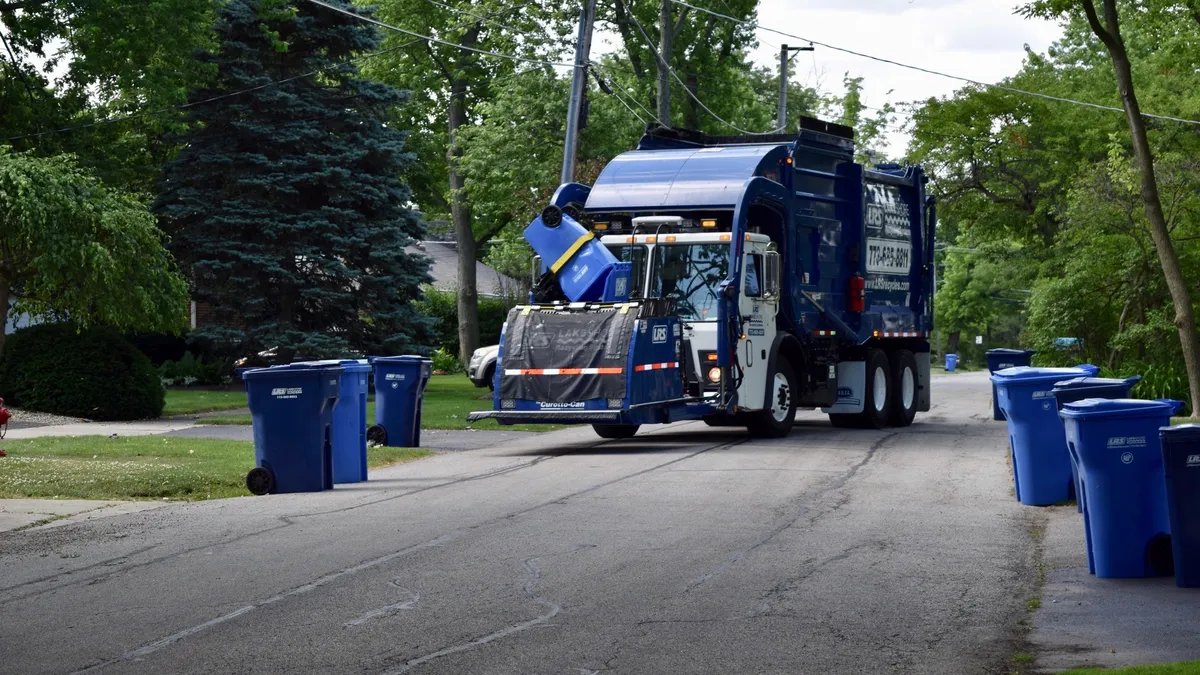Dive Brief:
- A Macquarie Asset Management fund has bought out multiple investors in LRS, a large Illinois-based waste and recycling company, in a recapitalization deal. Financial terms were not disclosed and Macquarie declined to comment.
- "Our growth will become exponentially faster, if that’s even possible," said LRS CEO Alan Handley in an interview confirming the deal. "We’re looking to build a sizable permanent waste company inside the space, and I think everything we’ve done to date and the new partnership with [Macquarie] just demonstrates that."
- The recently closed deal, done through the Macquarie Infrastructure Partners V fund, marks the exit of prior investors including Goldman Sachs Private Capital Investing, Maple Partners and Ironwood Capital, as well as others that gained smaller stakes in LRS when their businesses were acquired. Terms were based on LRS having an estimated $290 million annual revenue run rate, factoring in recent acquisitions and contract wins, from operations in six states.
Dive Insight:
Industry observers have long speculated about the next steps for LRS, previously known as Lakeshore Recycling Systems, as it continues to grow at a rapid pace. Given the track record of Macquarie, a large private equity investment firm, this new backing positions LRS to scale up even further.
Prior Macquarie investments include Waste Industries, WCA Waste and GFL Environmental (which later acquired the former two). WIN Waste Innovations, a New Hampshire-based company created from the acquisitions of Wheelabrator and Tunnel Hill Partners, was previously the portfolio's only active U.S. waste investment. Handley said he doesn't expect LRS will have any connection with WIN Waste, or follow that company's possible plans to go public any time soon.
Goldman Sachs invested in LRS in 2017, maintaining a 46% stake in the company as of January. Handley described them as "a really great partner" that helped LRS grow substantially, but said the new private equity funding provides a longer horizon with more capital for even larger investments in the business. Goldman could not be reached for comment.
According to recent analysis by credit rating agency Moody's, the recent LRS recapitalization included a $300 million senior credit facility that was used (along with new equity from Macquarie) to fund the buyout of prior investors and repay existing debt. LRS is also issuing a $23 million delayed draw term loan to fund acquisitions and a new $75 million, five-year revolving credit facility. In its assessment, Moody's called out relatively high capital expenditure needs, due in part to approximately 20% of the company's fleet being more than 16 years old, but overall described a solid outlook for the LRS business.
LRS has an estimated 1,400 employees and describes itself as the fifth-largest private waste and recycling company in North America. The company currently operates in Illinois, Indiana, Iowa, Michigan, Minnesota and Wisconsin. In addition to the core solid waste and recycling business, LRS also has a focus on portable restroom rentals, street sweeping and other related services.
Lakeshore was formed in 2012 with the merger of two Chicago-area companies, Recycling Systems and Lakeshore Waste Services, that brought together sizable hauling operations and a large MRF. The company has expanded substantially since then through an estimated 30 acquisitions. Recent milestones include the acquisition of an Illinois landfill (making it a vertically integrated operation), the purchase of longtime family hauler Roy Strom (its largest deal to date at the time) and the award of a large residential recycling contract in Chicago.
Ironwood Capital, which has backed numerous private waste companies over the years, recently invested in LRS to help fund the Strom transaction and described it as a "transformative" opportunity at the time. Ironwood wasn't available for comment on the recapitalization.
Some of the latest LRS transactions include the purchase of a municipal transfer station in Illinois that will also expand options in the Iowa market, as well as a C&D recycler that grows the company's footprint into the Minneapolis area.
Handley said he and others in the industry are seeing deal activity at record levels, fueled in part by concerns about possible capital gains tax changes. He said that was also a factor behind why some smaller LRS investors chose to to take a buyout, as they'd come into the company via the acquisition of family waste businesses.
Looking ahead, Handley said LRS has a number of deals in progress that will expand its scale. He also believes the company may be better positioned to go after certain opportunities than some large competitors who could attract greater regulatory scrutiny due to the Biden administration's stated focus on antitrust issues.
“We will geographically expand, we will continue to densify and do tuck-ins," he said. "There’s a lot of companies of decent size in the Midwest that are looking at how to monetize or how to gracefully exit, and I think we fit the bill for them because we’re sort of different than everybody else."
In its analysis, Moody's described the regional market as "fragmented and competitive, increasing the likelihood of further acquisitions to accelerate growth."












